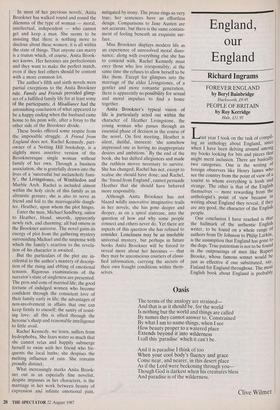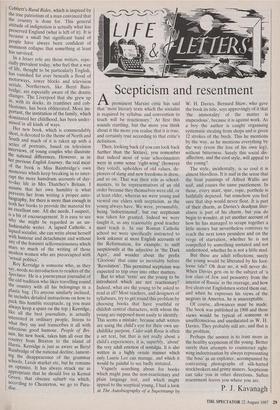England, our England
Richard Ingrams
FOREVER ENGLAND by Beryl Bainbridge
Duckworth, f9.95
PEOPLE OF BRITAIN by Roy Kerridge
Hale, £11.95
Last year I took on the task of compil- ing an anthology about England, since when I have been delving around among my books looking for bits and pieces that might merit inclusion. There are basically two categories. One is the writing of foreign observers like Henry James who see the country from the point of view of a tourist to whom everything is fresh and strange. The other is that of the English themselves — more rewarding from the anthologist's point of view because in writing about England they reveal, if they are any good, the character of the English people.
One conclusion I have reached is that the hallmark of the authentic English writer, to be found on a whole range of authors from Dr Johnson to Philip Larkin, is the assumption that England has gone to the dogs. True patriotism is not to be found in the outpourings of men like Rupert Brooke, whose famous sonnet would be just as effective if one substituted, say, Finland for England throughout. The most English book about England is probably
Cobbett's Rural Rides, which is inspired by the true patriotism of a man convinced that
the country is done for. This general attitude of indignation is actually what has preserved England (what is left of it). It is because a small but significant band of people have always been confident of imminent collapse that something at least has survived.
In a lesser role are those writers, espe- cially prevalent today, who feel that a way of life, thought to be particularly English, has vanished for ever beneath a flood of motorways, tower blocks and television aerials. Northerners, like Beryl Bain- bridge, are especially aware of the drastic changes. The Liverpool that she grew up in, with its docks, its tramlines and cob- blestones, has been obliterated. More im- portant, the institution of the family, which dominated her childhood, has been under- mined in all kinds of ways.
Her new book, which is commendably short, is devoted to the theme of North and South and much of it is taken up with a series of portraits, based on television interviews, of young couples who illustrate the national differences. However, as in her previous English Journey, the real meat of the book is Miss Bainbridge's own memories which keep breaking in to inter- rupt the more humdrum accounts of day- to-day life in Mrs Thatcher's Britain. I assume that her own humility is what prevents her from writing a proper auto- biography, for there is more than enough in both her books to provide the material for an excellent one. All she needs, I suspect, is a bit of encouragement. It is easy to see why she might be regarded as anun- fashionable writer. A lapsed Catholic, a lapsed socialist, she can write about herself with humour and detachment and without any of the feminist selfconsciousness which mars so much of the writing of those modern women who are preoccupied with sexual politics'. Roy Kerridge is someone who, as they say, needs no introduction to readers of the Spectator. He is a journeyman journalist of the old tradition who likes travelling round the country with all his belongings in a plastic bag. (To anyone similarly inclined, he includes detailed instructions on how to pack this humble receptacle, eg you must always keep a spare on the top.) Kerridge, like all the best journalists, is actually interested in ordinary people, listens to What they say and transcribes it all with infectious good humour. People of Bri- tain, his new book, takes him all over the country from Brixton to the island of Harris. Kerridge is just as aware as Beryl Bainbridge of the national decline, lament- ing the disappearance of the grammar schools, Leeds market etc, but he remains an optimist. It has always struck me as appropriate that he should live in Kensal Green, that obscure suburb via which, according to Chesterton, we go to Para- dise.











































 Previous page
Previous page